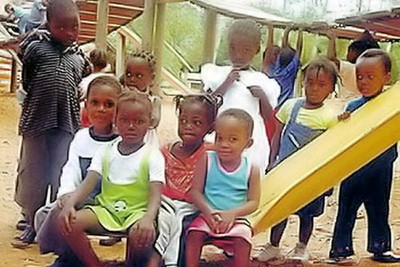SOS Schools in Mozambique
In Mozambique, a third of young girls are not enrolled in primary school education.
In Mozambique, there are currently four SOS Nurseries and four Primary Schools. These facilities provide education to children from SOS Villages and from the wider community. Staff members are well trained and the resources available to students are of a high standard. Below you can find an overview on the SOS Children education projects.
Inocencio's Story
Inocencio is 17 years old and works hard at home and at school. Inocencio would like to train as an electronics engineer and gain a place at a public university. But with only three such universities in Mozambique, competition is high and Inocencio knows his grades will need to be good to secure a place. Even though he’s ambitious and a dedicated scholar, he still finds time to help with housework and with his brothers and sisters, before reading and studying after dinner.
Inhambane : SOS Schools
The SOS Nursery at Inhambane has around 50 pupils, with places for up to 90 from both the SOS Village and community around.
- Between 8.00 and 15.30 each day, the nursery provides a fun-filled environment with activities both indoors and outside for children aged three to five years.
- The nursery children are taken on regular outings into the local area as part of their learning experiences.
The SOS Primary and Complete School at Inhambane has around 600 students, with approximately 30 coming from the SOS village and the remainder from the local community.
- Pass rates of students average at around 85 per cent and the school is working to improve these results even further.
- Children take part in a range of extracurricular activities including football, gymnastics, singing and art. Recently pupils planted 100 fruit trees and cassava plants, though the soil around the school means that fruiting success will be hard to achieve. Hopefully, our students will be inspired by Craveirinha, one of our famous poets, who wrote about the citrus fruits of our region – ‘The Tasty Tangerines of Inhambane’.
 Maputo : SOS Schools
Maputo : SOS Schools
The SOS Nursery at Maputo has around 100 pupils, a few of whom come from the SOS village.
- The school was established in 1992 and consists of four group rooms, a kitchen and a playground.
- The children take part in a wide range of activities designed to introduce them to school life and teach them how to integrate socially.
The SOS Primary and Secondary School at Maputo has around 830 students, with approximately 50 SOS children.
- The school has 24 classrooms, a canteen and a laboratory. Before the academic year begins in February, the school prepares for the arrival of the students with selection and hiring of any new teachers, training for existing teachers and the planning of lessons.
- Education achievement among pupils is high with a 93 per cent pass rate. However the school will only be fully content when a 100 per cent rate is achieved.
Pemba : SOS Schools
The SOS Nursery at Pemba has around 90 pupils, with capacity for up to 150 children.
- The school has four rooms and a playground for children in levels 1-5.
- The children are involved in a scheduled programme of activities each day and are taught by a dedicated team of staff.
The SOS Primary and Secondary School at Pemba has capacity for over 1,900 students.
- The school has 24 classrooms and offers a first-class education to children of the area.
- To work towards even higher pass rates, the school has recently introduced remedial courses early in the 2nd trimester to help any students who are struggling during the school year.
Tete : SOS Schools
The SOS Nursery at Tete takes around 100 pupils, both from the local community and the SOS Village.
- The school caters for children in levels 1-5 and a varied programme of activities is planned for each year. The school has four group rooms, a kitchen and a playground.
- Not all children complete the full school year as parents transfer to different areas in order to find work.
The SOS Primary and Secondary School at Tete has capacity for up to 3,000 students. Lessons are held in three streams, including night school, to enable the teaching of this many children.
- The school has 57 classrooms, a laboratory and a sewing room and offers a high standard of education to children in the area. Over 90 per cent of primary level children achieve a pass at the end of the year and over 75 per cent at secondary level.
- The school aims to offer courses outside the standard curriculum, such as lessons in agriculture.

 Return to Schools Wikipedia Home page…
Return to Schools Wikipedia Home page…
